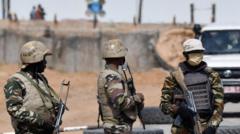The assault on a Nigerien military base by over 200 gunmen on motorbikes resulted in significant casualties among soldiers. The Nigerien government has faced scrutiny over its inability to prevent such attacks, especially following the recent coup that deposed the democratically elected president.
Jihadist Attack Claims Lives of Soldiers in Niger as Military Faces Growing Pressure

Jihadist Attack Claims Lives of Soldiers in Niger as Military Faces Growing Pressure
A recent attack on a Niger army base highlights the ongoing jihadist threat in the Sahel region.
In a brazen attack on a Niger army base, more than 200 armed jihadists on motorbikes stormed the facility near Banibangou, resulting in the death of at least 34 soldiers, as reported by the Nigerien defense ministry. This latest violence, deemed "cowardly and barbaric," constitutes a substantial escalation in the ongoing jihadist insurgency that has plagued the region for years. In addition to the fatalities, the assault left 14 other soldiers injured, with government forces reportedly managing to kill "dozens of terrorists" during the clashes.
The attack has intensified pressure on Niger's military leadership, particularly in light of recent political upheaval that saw the overthrow of democratically elected President Mohamed Bazoum in July 2023. The military junta cited the inability to control militant violence as a key reason for the coup, leading to increased scrutiny surrounding their effectiveness.
The Nigerien defense ministry detailed that the attackers infiltrated the town with a convoy of vehicles and motorbikes, a tactic that has become increasingly common amongst jihadist groups across the Sahel region. In response, Niger's military forces have initiated search operations in Banibangou to locate and confront the surviving assailants.
The location of the attack, close to the borders of Mali and Burkina Faso, exposes the realities of the regional insurgency, with Niger's military now confronting not only the threat posed by jihadist groups but also a significant shift in international military alliances. Following the coup, Niger's junta expelled French and US military forces that were previously engaged in combating terrorism, opting instead to bolster ties with Russia and Turkey.
Despite the junta's efforts to form a regional alliance with Burkina Faso and Mali against jihadist insurgents, the frequency and brutality of attacks continue to challenge their stability. The recent attack underscores the precarious situation faced by West African nations in addressing an ever-expanding threat posed by militant groups, compelling leaders to reconsider their strategies in a landscape where violence often overshadows diplomatic solutions.


















